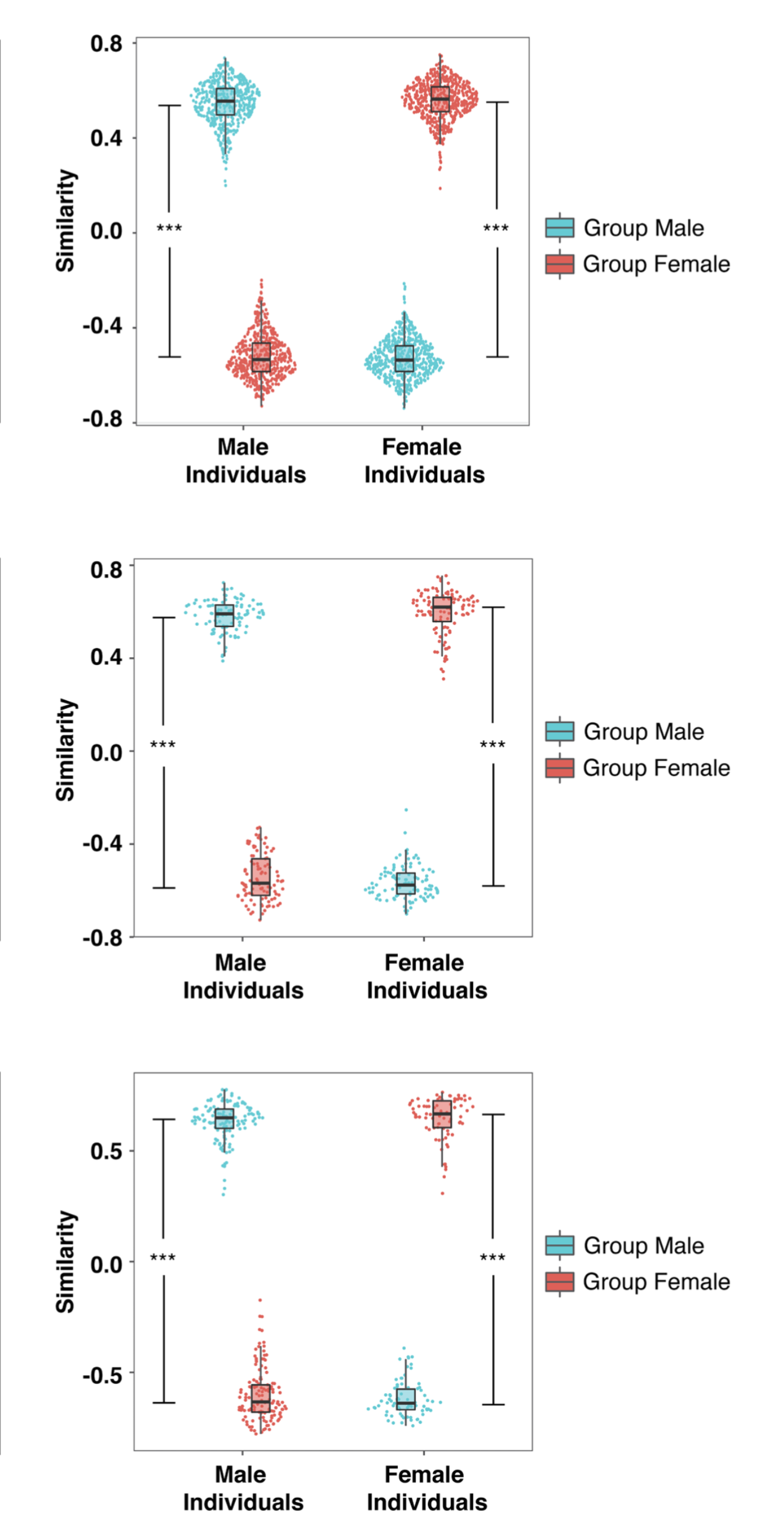The text of the study says they specifically focused on a segment of the dataset from 20-35 years old to minimuze variation among the sex cohorts.
knightly
I looked into this, the study analyzed three pre-existing fMRI datasets.
I wasn't able to find any info on how these projects assessed sex/gender of participants.

More like a proof of concept, since they didn't significantly improve upon the accuracy of their predictions compared to prior models.
I think so. With a more diverse dataset and fewer binary assumptions baked into the analysis I think we'd start seeing the bimodal contours of a spectrum between the masculine and feminine peaks. The graphics included in the study seem to hint at this, showing nodes of similarity with a tapering tail toward the middle of the distribution for all three sets of data they analyzed:

Found myself a copy of the paper for a read-through and it's immediately obvious to me why they couldn't get above 90% accuracy.
The word "Gender" occurs exactly zero times in the text and the datasets they worked with were divided into a strict sex binary. As a result, the accuracy of their models' predictions could not significantly improve upon prior work in the field.
The only new info here is that their XAN is able to point out the specific brain features that influenced its predictions. Potentially useful with regards to the development of treatments for gendered brain issues in neurotypical people, but anyone who falls outside of the 90th percentile of sexually dimorphic normativity won't see any benefit here.
I can't say I disagree with you in the abstract either, but our society as it is currently arranged is solely concerned with those short-term capitalistic goals.
The benefits of labor-saving technology are not distributed evenly, so long-term consideration should be given to how the technology will exacerbate the already-precipitous economic inequity between people who work for a living and those who collect rents on the Capital they own.
Of course not, the wastefullness of neural network models is only my first complaint because it's the thing that will see the first wave of NNM companies going bankrupt this year.
I don't care about the human artist's energy use because it's a human that's benefitting from having work to do and a warm, well-lit studio to do it in, while NNMs only exist to "reduce labor costs" I.E. so that corporations don't have to pay humans and shareholders can take a bigger cut.
In addition to the sociopolitical argument, my other primary complaint is a moral one. Neural network models are based on organic neural networks, but the enumerated rights of living beings are not substrate-independent. These psychopaths are too busy torturing their third or fourth generation of digital slaves to worry about the implications of their work. They're already building them on the scale of dog brains and at the rate they're going they'll be running human-scale models and maybe even simulated people before the end of the decade. I'm not so naive as to believe that the current crop of models is "alive" in the sense that dogs are, but that line is going to get very blurry very quickly as they build complexity towards the goal of "General Intelligence". Anything that is "generally intelligent" is deserving of the same rights given to people, and lesser versions still deserve at least the same consideration we give to animals.
You shouldn't be using a waste of electricity like image generators anyway.
If you actually need an image, commission an artist.
Imagine having to raise an entire city 6 feet so there's room to install a sewage system.
You can import a bunch of rss feeds at once if they are saved as a .opml file, and you can find a big ol' list of 'em at https://github.com/plenaryapp/awesome-rss-feeds
And what's the actual danger of connecting it to wi-fi?
Not so much that hackers will ransom the washing machine, but that hackers can use IoT devices as a back-door to get into your home network and take over everything else too.
Nah, he's right. "Sanity" is a made-up label used to justify the mistreatment of people considered by the ruling class to be unsightly or inconvenient.